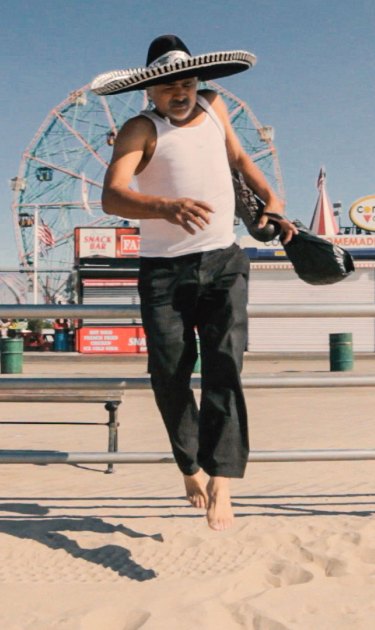In directing duo Lindsey Cordero and Armando Croda’s poignantly modest documentary, Ya me voy (I’m Leaving Now), a charro-hat wearing Felipe de Jesús Hernández Salás – an undocumented father originally from the Mexican state of Guerrero – drags loneliness and guilt around New York City. The root of his affliction is widely shared by millions of people.
The emotional burden of their separation has started to feel like an excessive price to pay in exchange for financial stability.
For immigrants lacking a path to legal status, the inability to return to their home countries – even for a funeral – without losing the access to earn a living in the U.S. carries unbearable heaviness. Once you’ve left, you may never return, meaning you lose the chance at the income that keeps your family afloat across borders. But Felipe can’t stand the absolutism of that sacrifice, which has tortured countless parents, who have had no choice but to leave their children behind in order to provide.
His 16 years in New York have allowed him to build a house for his wife and children back in Mexico, but the emotional burden of their separation has started to feel like an excessive price to pay in exchange for financial stability. He’s decided to return and knows the definite nature of that move, but he’ll accept poverty and struggle to hold his youngest son, who he affectionately calls Cesarín, for the first time since he last saw him as an infant. Now a teenager, the boy refuses to call Felipe, a man he doesn’t remember, father – a crushing notion for the protagonist.
Felipe is not a perfect man, and Cordero and Croda never try to pass him off as one, but if one thing holds sincerity, it’s his constantly expressed fear of not being loved back by Cesarín even if physically there. Or that his absence for virtually the entirety of his son’s life might have created an irreparable wound. Over the phone, Felipe tries to remain present, but long-distance fathering can’t ensure the intimacy he nearly begs for.
Collecting cans and glass bottles to sell – with the camera at first mounted on his cart for an in-the-moment effect and then following him through his daily odyssey as a silent witness – allows Felipe to make enough money to survive humbly in the big city and send a few hundred dollars a month to his loved ones. Yet, the excessive effort it requires, not to mention the other cleaning jobs he takes on, also makes for an isolating existence.
Observational in approach, the concise film shows the passage of seasons just as Felipe becomes ambivalent about his trip back.
Observational in approach, the concise film shows the passage of seasons just as Felipe becomes ambivalent about his trip back. The filmmakers accompany him without ever intervening or making their presence known, and the handheld cinematography takes us along for his exhausting, but dignifying routine.
Still, Felipe goes on singing classic tunes out loud as he traverses the boroughs to soften his hurtful burden and satisfies his craving for community with a slice of familiarity and comfort food at a Mexican deli. Although Felipe’s story is far from exceptional within the undocumented community, it’s his cheerful personality that captivates, even when the behavior perpetrated on screen is of the morally deviant kind. Nursing his sexual and emotional needs, despite being married, he gets a girlfriend, Dionicia, who shares in his enjoyment of folkloric attires and whose son also awaits her far away.
Croda and Cordero, who was fittingly a producer on Jim McKay’s similarly themed scripted feature En el séptimo día, gained access to narrative nuggets as intimate as a naked embrace or a tear-stained conversation for a timely and sensitive portrait of a man that speaks loudly for the anguish of many. A loving dad torn between the place where his heart thinks he’s needed and the pragmatic realization that while away those who stayed likely changed. Felipe assesses the decision with the advice of men in the periphery, but ultimately the choice is only his and the consequences of either are monumental.
I’m Leaving Now won’t teach those already familiar and sympathetic to the undocumented cause anything new, but it’ll introduce them to yet another character that reaffirms the validity of the fight so that someday people won’t have to choose between feeding their children or being by their side.
I’m leaving now is in theaters now.




